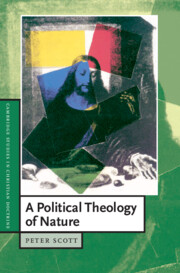1 - Nature in Christian theology: politics, context and concepts
Published online by Cambridge University Press: 09 November 2009
Summary
The aim of this book: political theology of nature
The motivation for writing this book lies in my belief that Christian theology has an important contribution to make to the reinterpretation of the human habitat demanded by ecology and the reconfiguration of human social life demanded by the imperatives of environmental sustainability. Yet I am also convinced that a new type of theology of nature is now required.
In theological discussions of the environment, attention has been focused on the relation between theology and the natural sciences, on the one hand, and the ‘value’ of nature, on the other. Yet the concentration on these two areas is to construe the concerns of environmentalism too narrowly. Environmental concern is not directed to some abstraction, called Nature. Instead, such concern is directed towards the quality and character of habitation, including the habitation of humanity. Questions privileged by environmentalism include: how do life forms interact? How might the quality of life be improved? How can life be sustained in the long term? With these questions come certain perspectives for interpretation (global, aesthetic) and commitments to simpler, more sustainable forms of life (recycling and decentralisation, for instance).
Such questions, perspectives and commitments are not exhausted by inquiries in the natural sciences or into the ‘value’ of nature. A third area of inquiry emerges: the distortions of human sociality as enacted in the relations of un/natural humanity with nature.
- Type
- Chapter
- Information
- A Political Theology of Nature , pp. 3 - 29Publisher: Cambridge University PressPrint publication year: 2003

